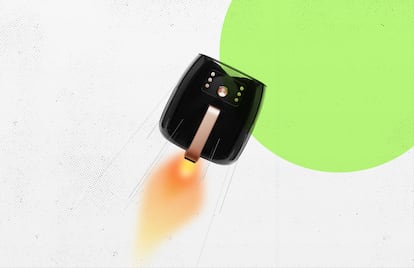The dark side of your air fryer
How are the popular devices doing? The answer is clear: They’re on fire

Last week, the first liftoff test of a SpaceX Starship rocket, the most powerful man-made launch vehicle, ended in a fabulous fireworks show above the Gulf of Mexico. On the other hand, despite the accolades of the publishing world, the bestselling books, year after year, are collections of recipes for air fryers.
The air fryer beats out the Starship for the junk of the decade. Its swarm of cookbooks have led Amazon lists since the device hit the market. The machines promise to take us outside the tedium of the everyday. They offer an exciting future, far from the familiar debacles of our domestic planet.
Among the fundamental issues that disturb humans’ peace, one of the most pressing is the need to eat three times a day, daily, for some 80 years of life. But what bothers us today, in the privileged sectors of Western society, is not the urgency to satisfy physical hunger to stay alive, the bottom level of Maslow’s pyramid. We all know that we will never die of hunger.
The air fryer’s promise is the same as the instant pot, the crockpot and the microwave: just press a button and forget about cooking. It is the definitive automatization of domestic food preparation, allowing us to embrace a new, modern paradigm of multitasking and freedom.
But despite promising more free time, the hunger that air fryer recipes satisfy is another one: the third, fourth and fifth levels of Maslow’s pyramid, belonging, self-esteem and self-actualization.
With the newly purchased gadget under their arms, each happy new owner is immersed in an online community that welcomes them with open arms and an endless fund of content ranging from beginner tutorials to expert tricks. Every contribution is debated and celebrated. Amidst this constant back and forth of comments and virtual hugs on forums and Facebook pages, these collaborative resource repositories teach millions of people the basics of the device. They help turn the isolation of preparing family meals into a collective activity.
The device’s success draws on the same sources that feed Facebook, Instagram and Twitter: the need to belong to a community and the need for recognition. The reward mechanisms for the publication of a useful trick, a successful recipe, or a brilliant meme, in the form of responses, likes and retweets, work by activating the most ancient parts of our primitive brains, which know that survival is a group matter, and loneliness equals death.
The curious thing is that increasing efficiency in household tasks does not guarantee more free time. What leaves us without free time is something else.
As Anne Helen Petersen explains in her successful book Can’t Even, an analysis of burnout among the millennial generation, the most productive in history, “We know that the utopian promises of technology—to make work more efficient, to make connections stronger, to make photos better and more shareable, to make the news more accessible, to make communication easier— have in fact created more work, more responsibility, more opportunities to fail like a failure.” We work better, but we don’t work less, and we don’t have more free time.
Sautéing some vegetables with a drizzle of oil in a frying pan is faster, better and cheaper than buying the gadget of the moment, using it a couple of times and keeping it in that cupboard next to the yogurt maker, the bread maker and the machine to make fresh pasta. (The price per square meter of rent is far too high to use the kitchen as a storage room.) Cooking is already a way of belonging to a community, or one of many possible ones, not to one codified in recipe books without context, character, or history.
Don’t be fooled. What both Elon Musk and the manufacturers of all of these contraptions want is for us to put more hours into our precarious jobs and to blame our lack of time on the kitchen. Then, to solve both the time issues and the need for human contact outside of work, they want us to buy their junk and share it on social media.
They will not succeed.
Sign up for our weekly newsletter to get more English-language news coverage from EL PAÍS USA Edition
Tu suscripción se está usando en otro dispositivo
¿Quieres añadir otro usuario a tu suscripción?
Si continúas leyendo en este dispositivo, no se podrá leer en el otro.
FlechaTu suscripción se está usando en otro dispositivo y solo puedes acceder a EL PAÍS desde un dispositivo a la vez.
Si quieres compartir tu cuenta, cambia tu suscripción a la modalidad Premium, así podrás añadir otro usuario. Cada uno accederá con su propia cuenta de email, lo que os permitirá personalizar vuestra experiencia en EL PAÍS.
¿Tienes una suscripción de empresa? Accede aquí para contratar más cuentas.
En el caso de no saber quién está usando tu cuenta, te recomendamos cambiar tu contraseña aquí.
Si decides continuar compartiendo tu cuenta, este mensaje se mostrará en tu dispositivo y en el de la otra persona que está usando tu cuenta de forma indefinida, afectando a tu experiencia de lectura. Puedes consultar aquí los términos y condiciones de la suscripción digital.









































